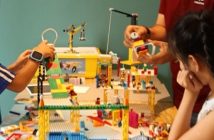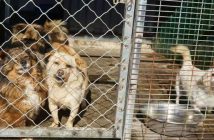
Fuxing Lu extends from Fuxing Bridge on the Second Ring Road in the east to Wukesong by the Fourth Ring in the west. Considered an extension of Chang’an Street and a business center in West Beijing, many head offices of big banks and companies are located in this part of town. But if you happen to look beyond the corporate buildings, you’ll notice that the area of Fuxing Lu covers many interesting cultural sites perfectly suited for adventurous parents and kids.
Yuyuantan Park
 Located to the north of the China Millennium Monument, this park is famous for its cherry blossoms: Over 3,000 cherry trees grow around Yuyuantan Lake, as well as begonia, ginkgo, poplar and pine trees. Every March, the park hosts a cherry blossom festival, when the white and pink flowers bloom splendidly like clusters of clouds. You can even sponsor a cherry tree to teach your kids more about loving nature and protecting the environment. RMB 2, RMB 1 for students, RMB 4 for a monthly pass, RMB 10 during the cherry blossom festival. Yuyuantan Park. Daily 6.30am-7pm (Dec-Mar); 6.30am-8.30pm (Apr-May); 6.30am-9.30pm (Jun-Jul). 1A Yuyuantan Nanlu, Haidian District (8865 3800) www.yuyuantanpark.com
Located to the north of the China Millennium Monument, this park is famous for its cherry blossoms: Over 3,000 cherry trees grow around Yuyuantan Lake, as well as begonia, ginkgo, poplar and pine trees. Every March, the park hosts a cherry blossom festival, when the white and pink flowers bloom splendidly like clusters of clouds. You can even sponsor a cherry tree to teach your kids more about loving nature and protecting the environment. RMB 2, RMB 1 for students, RMB 4 for a monthly pass, RMB 10 during the cherry blossom festival. Yuyuantan Park. Daily 6.30am-7pm (Dec-Mar); 6.30am-8.30pm (Apr-May); 6.30am-9.30pm (Jun-Jul). 1A Yuyuantan Nanlu, Haidian District (8865 3800) www.yuyuantanpark.com
China Millennium Monument
 The China Millennium Monument attracts hundreds of people every day. The main building is shaped like an enormous sundial, and a 262-meter-long bronze lane in front of the altar is inscribed with a brief record of Chinese history, from the first cavemen who lived in this region over three million years ago to the recent events of 2000 AD. The 117-meter-long mural inside the monument displays 5,000 years of Chinese history, and the Beijing World Art Museum inside the Millennium Monument holds year-round exhibitions on arts and cultures from around the world. RMB 30, RMB 20 for students. Audio self-guided tours in Chinese and English available for rent at the entrance. China Millennium Monument. Daily 9am-5.30pm, closed half day on Chinese New Year’s Eve. A9 Fuxing Lu, Haidian District (5980 2222) www.worldartmuseum.cn
The China Millennium Monument attracts hundreds of people every day. The main building is shaped like an enormous sundial, and a 262-meter-long bronze lane in front of the altar is inscribed with a brief record of Chinese history, from the first cavemen who lived in this region over three million years ago to the recent events of 2000 AD. The 117-meter-long mural inside the monument displays 5,000 years of Chinese history, and the Beijing World Art Museum inside the Millennium Monument holds year-round exhibitions on arts and cultures from around the world. RMB 30, RMB 20 for students. Audio self-guided tours in Chinese and English available for rent at the entrance. China Millennium Monument. Daily 9am-5.30pm, closed half day on Chinese New Year’s Eve. A9 Fuxing Lu, Haidian District (5980 2222) www.worldartmuseum.cn
Lu Lu Restaurant
 This restaurant offers a warm and cozy atmosphere in addition to a wide range of Shanghainese food: from the most casual jiachang cai priced around RMB 20 to fancy dishes like abalone in oyster sauce priced at over RMB 200. Situated next door to the Military Museum, this nicely decorated restaurant is a good place to grab lunch after spending the day at the museums and galleries nearby. Limited highchairs available for babies. Lu Lu Restaurant (menus in both Chinese and English). Daily 11am-2pm, 5pm-10pm, 9 Fuxing Lu, Haidian District (6858 3661) www.lulurest.cn
This restaurant offers a warm and cozy atmosphere in addition to a wide range of Shanghainese food: from the most casual jiachang cai priced around RMB 20 to fancy dishes like abalone in oyster sauce priced at over RMB 200. Situated next door to the Military Museum, this nicely decorated restaurant is a good place to grab lunch after spending the day at the museums and galleries nearby. Limited highchairs available for babies. Lu Lu Restaurant (menus in both Chinese and English). Daily 11am-2pm, 5pm-10pm, 9 Fuxing Lu, Haidian District (6858 3661) www.lulurest.cn
The Military Museum
 Warfare has been, and remains, a significant part of human history. At the Military Museum of China, learn about this history through eight exhibition halls featuring relics from the War of National Liberation. Study primitive swords and cannons, see models of Qing dynasty warships, examine the first wireless radio used by the Red Army, and view photos of battlegrounds. Teach your kids to love and value peace by learning about the tragedy of war. RMB 20, RMB 10 for students. The Military Museum (no English spoken). Daily 8am-5pm (Nov-Mar), 8am-5.30pm (Apr-Oct); last admittance at 4.30pm. 9 Fuxing Lu, Haidian District (6852 9647) www.chinamil.com.cn/site1/goin_museum
Warfare has been, and remains, a significant part of human history. At the Military Museum of China, learn about this history through eight exhibition halls featuring relics from the War of National Liberation. Study primitive swords and cannons, see models of Qing dynasty warships, examine the first wireless radio used by the Red Army, and view photos of battlegrounds. Teach your kids to love and value peace by learning about the tragedy of war. RMB 20, RMB 10 for students. The Military Museum (no English spoken). Daily 8am-5pm (Nov-Mar), 8am-5.30pm (Apr-Oct); last admittance at 4.30pm. 9 Fuxing Lu, Haidian District (6852 9647) www.chinamil.com.cn/site1/goin_museum
The Capital Museum
 Two hundred meters east of Muxidi subway station lies the Capital Museum. This six-story building houses 11 exhibition halls displaying ancient Chinese art: bronze statues, jade utensils, ancient calligraphy and paintings, restored old Beijing city views and precious relics of old Beijing operas. Two temporary exhibition halls on the first floor and basement level display artistic and cultural exhibits from around the world. RMB 30, RMB 15 for students, RMB 50 for temporary exhibitions. Audio self-guided tours in Chinese and English available for rent at the entrance. The Capital Museum. Tue-Sun 9am-5pm (last admittance at 4pm). 16 Fuxingmenwai Dajie, Xicheng District (6337 0492) www.capitalmuseum.org.cn
Two hundred meters east of Muxidi subway station lies the Capital Museum. This six-story building houses 11 exhibition halls displaying ancient Chinese art: bronze statues, jade utensils, ancient calligraphy and paintings, restored old Beijing city views and precious relics of old Beijing operas. Two temporary exhibition halls on the first floor and basement level display artistic and cultural exhibits from around the world. RMB 30, RMB 15 for students, RMB 50 for temporary exhibitions. Audio self-guided tours in Chinese and English available for rent at the entrance. The Capital Museum. Tue-Sun 9am-5pm (last admittance at 4pm). 16 Fuxingmenwai Dajie, Xicheng District (6337 0492) www.capitalmuseum.org.cn
Baiyunguan Temple
 Baiyunguan Temple is located 1,500 meters southeast of the Muxidi subway station and is the biggest Taoist temple in Beijing. First built in 741 AD, this well-preserved temple has a long and interesting history. One of Beijing’s annual Spring Festival ‘temple fairs’ takes place here every year. The Baiyunguan temple fair usually starts from Chinese New Yearís Day and lasts 18 days ñ the longest temple fair in the city. Vendors from all over the country will come here to show and sell their regional foods, handmade art and crafts, and special Spring Festival products; local performers will put on traditional shows of Peking opera, acrobatics and lion dances, as well as modern entertainments. Don’t miss this chance to experience a real Beijing way of celebrating the Spring Festival! RMB 10 park entry fee. Baiyunguan Temple. Daily 8.30am-4.30pm (May-Sep); 8.30am-4pm (Oct-Apr). 12A, Baiyunguan Jie, Binghe Lu, Xuanwu District (6344 3666)
Baiyunguan Temple is located 1,500 meters southeast of the Muxidi subway station and is the biggest Taoist temple in Beijing. First built in 741 AD, this well-preserved temple has a long and interesting history. One of Beijing’s annual Spring Festival ‘temple fairs’ takes place here every year. The Baiyunguan temple fair usually starts from Chinese New Yearís Day and lasts 18 days ñ the longest temple fair in the city. Vendors from all over the country will come here to show and sell their regional foods, handmade art and crafts, and special Spring Festival products; local performers will put on traditional shows of Peking opera, acrobatics and lion dances, as well as modern entertainments. Don’t miss this chance to experience a real Beijing way of celebrating the Spring Festival! RMB 10 park entry fee. Baiyunguan Temple. Daily 8.30am-4.30pm (May-Sep); 8.30am-4pm (Oct-Apr). 12A, Baiyunguan Jie, Binghe Lu, Xuanwu District (6344 3666)
TT-Art Bookstore
 Musicians and music lovers will find this bookstore to be a haven: Not only can you find sheet music for all kinds of instruments – piano, strings, woodwind, brass, drums and more – but also books, CDs and DVDs about music history, theory, voice training and self-lessons. From Beethoven to Bob Dylan, this bookstore will satisfy a music lover’s every desire. When you have found your favorite book, head to the instrument store, which is only a few meters away, to get some professional tools or parts to repair and tune your instrument. TT-Art Music Bookstore (some English spoken). Daily 9am-9pm. 43 Baojia Jie (600m south of Fuxingmen Bridge), Xicheng District (6641 1860) www.tt-art.com
Musicians and music lovers will find this bookstore to be a haven: Not only can you find sheet music for all kinds of instruments – piano, strings, woodwind, brass, drums and more – but also books, CDs and DVDs about music history, theory, voice training and self-lessons. From Beethoven to Bob Dylan, this bookstore will satisfy a music lover’s every desire. When you have found your favorite book, head to the instrument store, which is only a few meters away, to get some professional tools or parts to repair and tune your instrument. TT-Art Music Bookstore (some English spoken). Daily 9am-9pm. 43 Baojia Jie (600m south of Fuxingmen Bridge), Xicheng District (6641 1860) www.tt-art.com



